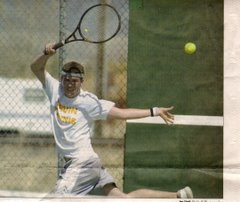At Wimbledon this year, Jelena Jankovic will walk onto the grounds of the All England Lawn and Tennis Club with scrubbed-clean finger nails, rid of the royal, bright blue she sported just a few weeks ago at Roland Garros.
She won’t be writing any love letters to British fans on her taped-up arm, as she did in Paris, or mimicking countrywoman Ana Ivanovic’s fist pump (at least until a possible repeat, semifinal clash).
That last match against Ivanovic was a heartbreakingly difficult loss for the Serb, now 23, reaching her fourth grand slam semifinal only to fall short of the big show for the fourth time, as well.
Her hard-hitting baseline game, tight-pulled ponytail, on-court antics and failure to breakthrough into tennis’ elite has me thinking of a certain American teen from the early 1990s. Any guesses on who?
Yes, Jennifer Capriati has been surfacing lately when I think of Jelena Jankovic and not just because they play alike, look alike and act alike, but more because Jankovic is at the dangerous point in her career that Capriati was at in 1991 when she faltered in her famous match against Monica Seles.
In 1991, Seles and Capriati were countrywomen, close in age, had similar styles of play and had tennis experts and fans alike calling for multiple-slam careers for the both of them.
Fast forward to 2008, and there was much the same going on at Roland Garros between Ivanovic and Jankovic. Ana had been slightly more successful at the slams and in their head-to-head history (like Seles), but hadn’t broken through as Monica had in ’91. And perhaps, as Americans, we forget what Roland Garros means to European players like Jelena and Ana, whose rivalry is growing at a faster pace than one of Jankovic's down-the-line backhands.
So, will Jankovic’s loss (6-4 in the third set) have the same impact that Capriati’s (7-6 in the third) did?
It must be pointed out that Jennifer had quite the different upbringing than Jelena did. Capriati was banging professional tennis balls by the tender age of 13 and succumbed to continuous pressure late in her “early” career.
Jankovic, on the contrary, has only been on a steady rise up the rankings, finally breaking through in 2006 at Wimbledon (beating then defending-champ Venus in the third round) to join the upper echelon on the women’s game.
But the significance of the Capriati loss 17 years ago had me thinking hard about how far Jelena has come and how far she could have already gone. There was a break in concentration at the ’06 U.S. Open against Justine Henin where she lead 6-4, 4-2 and decided to argue a line call for two games only to lose the next 10 and the match. And then there was a missed opportunity at Wimbledon last year where she blew her fourth-round match against Marion Bartoli (the eventual finalist), or her lack of confidence at this year’s Australian in the semis against Maria Sharapova.
The bottom line is, Capriati’s career went south after her loss to Monica Seles at the 1991 U.S. Open semifinals, and Jelena Jankovic has to be sure that history doesn’t stamp “Capriati” on her “Jankovic” passport.
Her loss to Ivanovic just two week’s ago was crushing for Jelena, who said after the match she just wanted to "get drunk" and forget about it and had reportedly been crying in the locker room before her press conference.
For Wimbledon to come so soon after the French is to Jankovic’s advantage – or, her disadvantage – depending on which way you look at it. She plays Ukranian Olga Savchuk in the opening round, whose current rank of 113 in the world is similar to Capriati’s first grand slam opponent after her loss to Seles: Natalia Medvedeva another Ukranian, who was ranked 96th at the 1992 Australian.
Perhaps the parallels that I’m drawing are rather stretched, but it is a thin line that Jankovic is walking right now in her fragile career. Where Capriati suffered from burnout, over-exposure and daunting pressure, Jankovic toys with playing too much and through injuries and an increasingly difficult psychological question: When will it be her turn?
For Capriati, that answer didn’t come until a decade later, when she won the Australian Open at the age of 24. But in today’s game, Jankovic doesn’t have a decade. Instead, she only has now, and if she wants to announce her arrival in the women’s game, there’s no place better to do it than at tennis’ biggest tournament.



